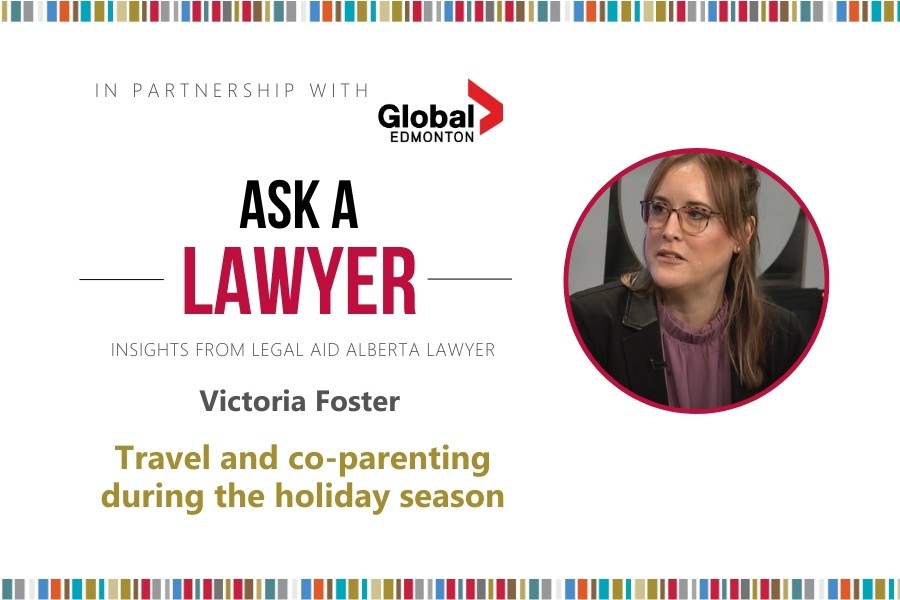The holiday season is upon us, and for many Alberta families experiencing separation or divorce, there are questions about holiday travel with children, from domestic to international trips.
As families navigate the complexities of co-parenting during the holiday season, understanding the legal considerations can help ensure a smoother experience for both parents and children.
Legal Aid Alberta staff lawyer Victoria Foster appeared on Global Edmonton’s Ask a Lawyer to discuss travel and co-parenting during the holidays.
View the Ask A Lawyer segment:
Transcript of the segment:
Vinesh Pratap: The Christmas season is upon us, and for many families experiencing separation or divorce, there are questions about holiday travel with children, from domestic to international trips. Here with us this morning to discuss travel and co-parenting is Legal Aid Alberta staff lawyer Victoria Foster. Victoria, thanks so much for coming in, a very timely issue.
Victoria Foster: Yes, thanks for having me.
Vinesh Pratap: So yeah, this could be a very tense time, and you don’t want to get the kids all worked up, so let’s talk about travel when it comes to the holiday season, specifically out of country. So let’s say one parent wants to take the kids to Disneyland. What type of documentation is needed?
Victoria Foster: So, the hope is that you would have a notarized travel consent letter, something that the parents can agree upon, that would outline where you’re traveling, who you’re traveling with, passport information, that kind of thing. And that’s something you present to the border officials. If you’re not able to come up with a consent like that, then you would need a court order that authorizes you to travel with your children without the consent of the other parent.
Vinesh Pratap: OK. Now Disneyland is one option, but on the other end of the scale, there are countries with travel advisories, for example, conflict zones. Does that, you know, up the responsibility for parents, you know, especially when they’re going through a divorce or separation when it comes to those type of international travels?
Victoria Foster: Yeah. So there are two things you should consider in those situations: one is whether the country you’re traveling to is a signatory to The Hague Convention, which is international law that deals with child abduction and ensuring that a child can get back to their home country. The second thing to consider is whether our federal government has issued any travel advisories to the country you’re traveling to, and those are all available online and you can see whether the government says travel freely or entirely restrict your travel.
Vinesh Pratap: OK, so that’s kind of the international travel aspect. What about domestically? One parent, for example, wants to take the kids to see the grandparents in Newfoundland and Labrador.
Victoria Foster: Yeah. So you don’t technically need anything. You don’t need that travel consent letter, but we do recommend the parents do have something in writing from the other parent, whether that’s a text message or email, something they’ve had written just saying that they agree with the travel. And that’s especially important if you do have a parenting order that is police enforceable.
Vinesh Pratap: Yeah. So this is something that requires a lot of discussion beforehand, right? So let’s bring this situation, the travel situation, even closer. The whole Christmas concerts, going to friends and family, how is that time supposed to be divided up when you know, there’s only a limited amount of time and there’s a lot of pressure out there?
Victoria Foster: Sure. So hopefully parents can consider what their kids would want. Do the kids want both parents at the Christmas concert or not? And lots of discussion around that. If they can’t come to that type of agreement, then that’s something that could go into a parenting agreement or parenting order and it could be permissive, saying either parent can go at any time or it could be restrictive saying you’re only allowed to go during your parenting time.
Vinesh Pratap: So this is where agreements are key. Like when you say agreements, are we talking like a handshake or are we talking something written with signatures, that kind of thing?
Victoria Foster: Depends how well we get along with the other parent. A handshake is fine, but you have to be able to trust them, right? So I mean, always in writing is better. And that could be informal between the two of you, or it could be some kind of more formal process through mediation or something like that. But the idea is to keep the decision being made by the parents because if you’re going to court, then that decision isn’t being made for you.
Vinesh Pratap: You know, anecdotally, what have you seen, you know, do things resolve themselves or, you know, have things blown up and, you know, is there a percentage out there or can you just do that?
Victoria Foster: I don’t know if there’s a percentage. I mean, certainly we see the worst where those with lawyers, we see the ones that do end up in court and I imagine that there’s a fair number of people that can resolve without having to involve lawyers or go to court as well.
Vinesh Pratap: This again, we’re talking beforehand is so critical and so important.
Victoria Foster: 100% and consider your kids.
Vinesh Pratap: OK. That is of course the most important aspect at the end of all of this. Victoria, thank you so much for coming in, this very important advice as we head into the Christmas season here and Legal Aid Alberta lawyers specializing in family law, child welfare, domestic violence, immigration and youth and adult criminal defense. If you have a question for a lawyer, they will gladly take it. Send it to [email protected]


